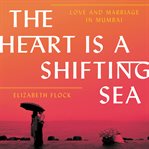Review by New York Times Review
THE HEART IS A SHIFTING SEA: Love and Marriage in Mumbai, by Elizabeth Flock. (Harper, $27.99.) Flock focuses on three very different couples as a way of examining domestic arrangements in modern India. Marriage, she finds, is hard for them in ways that are universal, and in ways that are culturally specific. VIBRATOR NATION: How Feminist Sex-Toy Stores Changed the Business of Pleasure, by Lynn Cornelia. (Duke University, $25.95.) One of the factors fueling second wave feminism was women's sexual liberation, a process of self-discovery and advocacy that included toys. Cornelia tells the story of the feminist sex-toy shops that led the way. MY LAST LOVE STORY, by Falguni Kothari. (Graydon House, paper, $15.99.) The narrator of this unconventional love story lives with her dying husband and his best friend, who has come to help out. Caught between her attachment to the men, she asks why it's unacceptable "for three people to openly love each other." GETTING OFF: One Woman's Journey Through Sex and Porn Addiction, by Erica Garza. (Simon & Schuster, $26.) Reading the 35-year-old essayist's insight into her own experience - the lonely (if impressively multi-orgasmic) world of a woman who binges on hookups - we begin to better understand ourselves. SOME HELL, by Patrick Nathan. (Graywolf, paper, $16.) In the opening pages, Nathan's evil-soaked novel about an adolescent grappling with his father's suicide and his own sexuality reads like a tragic coming-of-age tale. Then it peels that mask off like a replicant to reveal the more sinister creature beneath. FIRE SERMON, by Jamie Quatro. (Grove, $24.) This fantastic debut novel (Quatro is also the author of a highly original story collection, "I Want to Show You More") centers on both religious and sexual passion. The plot is simple: A married woman is trying to forget her lover. The book itself - erotic, spiritual, poetic - is anything but. A PRINCESS IN THEORY, by Alyssa Cole. (Avon.) Cole's main character, a young epidemiologist pursuing her Ph.D. in New York, is refreshingly down-to-earth, and her love affair with a young African prince develops at a satisfying slow burn. This novel checks a lot of boxes: STEM girls, gaslighting, sexual consent. SUNBURN, by Laura Lippman. (Morrow, $26.99.) This thriller may be set in a small town in Delaware in the mid-1990s, but it draws its inspiration from the noir romances of the 1940s: Two strangers with secrets meet in a town where nobody goes. Cool and twisty, with more heart than expected. STRAYING, by Molly McCloskey. (Scribner, $24.) In this wise, discomfiting novel, a feckless American travels to the west of Ireland, marries into a local family, then looks for love elsewhere. The full reviews of these and other recent books are on the web: nytimes.com/books
Copyright (c) The New York Times Company [January 6, 2019]
Review by Booklist Review
Magnificent, over-the-top romantic gestures; a war waged for one woman's love; and happily-ever-after Bollywood films paint a clear picture of romance in India. But real life, as three married couples show in this book, is more complicated. Whether her subjects eloped in defiance of the bride's father or were brought together by an online matchmaker, Flock puts you at the center of their stories in an impressive feat of reporting, bringing forward details culled from encounters and interviews over several years. The challenges faced by each couple are, in many ways, universal infertility, infidelity, spats over finances and family. But they are also unique to the cultures they belong to in India, where Western ideas jostle uneasily with Indian tradition. This is particularly evident in the great control that the parents exercise over their grown children's lives, from selecting who they will marry to controlling their daughters-in-law once they move into the family house. These three marriages, without the Bollywood polish, offer an unforgettable look at both the risks and rewards of real-life romance.--Thoreson, Bridget Copyright 2017 Booklist
From Booklist, Copyright (c) American Library Association. Used with permission.
Review by Publisher's Weekly Review
Journalist Flock invites readers into the homes, lives, and marriages of three couples-one Marwari Hindu, one Sunni Muslim, and one Tamil Brahmin Hindu-living in Mumbai in this multifaceted portrait of love and marriage in modern India. Layered with history and glimpses of the varied cultures compressed into one vivacious city, the book pays as much attention to the lives of its subjects as it does to that which binds them together: the rituals of courtship and intricacies of marriage law, religious observances and festivals, and changing conventions that are seeing more couples choosing to live apart from their families and more women choosing to work outside of the home. Flock finds people trying to find happiness within the slipknot of tradition, longing for film-style romance within their arranged marriages, and searching peace with their lives inside a city and a country undergoing rapid population growth, Western influence, and rising far-right sentiment. There's Ashok and Parvati, who get to know one another while planning a wedding (their courtship was arranged by their parents using an online matchmaking service); Shazhad and Sabeena, whose failure to conceive leads them to a more liberal practice of Islam (Sunni law doesn't recognize adoption); and Maya and Veer, career-oriented individuals who deal with infidelity and Maya's need for independence. Flock approaches the histories, hopes, dreams, and disappointments of her middle- and upper-middle-class couples as a reporter, not a storyteller, and the book is better for it, steering clear of caricature and sentiment, and letting each of her subjects emerge in the details of his or her own circumstances. Ostensibly a study of marriage as experienced by the people in it, Flock's book also provides a vivid portrait of a nation in transition, through the lives and desires of its most progressive city's residents. (Feb.) © Copyright PWxyz, LLC. All rights reserved.
(c) Copyright PWxyz, LLC. All rights reserved
Review by Library Journal Review
Journalist Flock's intention to write about "the Indian love story"-"because it seemed more honest and vulnerable," especially when compared to her parents' multiple failed marriages-began in 2008 when she first lived in Mumbai. Although a spinal injury unexpectedly sent her back to the States, Flock returned in 2014 to finish the book-her first-she started about three couples she calls "romantics and rule breakers": celestially misaligned Veer and Maya, who live separate lives together; childless Shahzad and Sabeena, haunted for decades by infertility; and online-matched Ashok and Parvati, who marry as near-strangers and grow to love each other. While the majority of Sunil Malhotra's narration is expectedly straightforward reportage of what's on the page, Malhotra sprinkles the narrative with spot-on characterizations: a young woman's shy agreement to marriage, a blustering father-in-law, a fortune-telling sage, an understanding doctor, and a sniping stepmother-in-law, among many others. VERDICT Western readers intrigued by distant cultures will appreciate the novel-like exposition here; literary purists might bristle at the visitor's white lens through which the most intimate details are revealed. ["All readers interested in Southeast Asian culture, as well as scholars of anthropology, sociology, and other social sciences, will be fascinated with this accessible account": LJ 2/1/18 review of the Harper hc.]-Terry Hong, Smithsonian BookDragon, Washington, DC © Copyright 2018. Library Journals LLC, a wholly owned subsidiary of Media Source, Inc. No redistribution permitted.
(c) Copyright Library Journals LLC, a wholly owned subsidiary of Media Source, Inc. No redistribution permitted.
Review by Kirkus Book Review
Intimate portraits of three marriages reveal family life in Mumbai.Flock, a reporter for PBS NewsHour and former investigative reporter for Forbes India Magazine, makes her literary debut with an absorbing, candid look at three couples as they confront life in a changing India. While families prefer marriages to be arranged, young couples imbibe notions about love and romance from Bollywood movies. One young husband worries about not having a car: in films, he reflects, "men took women out on long drives in their car or on their motorcycle. It was how they fell in love." Parents hire matchmakers, while single men and women try to find true love from dating sites and events. Fathers exert draconian control over daughters who yearn for autonomy. Flock lived with the couples for a while, observing their interactions; her journalistic style pays off. One couple shared their online chats with her; others kept in touch by email for nearly a decade. Each marriage faced problems. For Veer and Maya, their relationship was fraught from the beginning because Veer had been in love with another woman, who rejected him; and Maya, frustrated and volatileand, it emerges, a victim of sexual abuse as a childhad attempted suicide. Her restlessness and Veer's obsession with work strained their marriage. Maya considered divorce, but her reasons for unhappiness did not come under the stipulations of the Hindu Marriage Act; instead, she has affairs. Shahzad and Sabeena faced Shahzad's sterility; in a culture that expects marriages to grow into families, Shahzad felt desperate to prove his manhood, consulting medical doctors as well as fortunetellers, herbalists, and quacks. Ashok and Parvati, both Tamil Brahmins, felt pressure to marry within their caste and religion, although Parvati had been in love with a Christian man, inciting her father's rage, and Ashok had not yet found a companion. Brought together by a matchmaking site and affirmed by astrologers, they agreed to marry after meeting in person only briefly.An eye-opening exploration of how tradition and star-studded dreams shape love in modern India. Copyright Kirkus Reviews, used with permission.
Copyright (c) Kirkus Reviews, used with permission.


